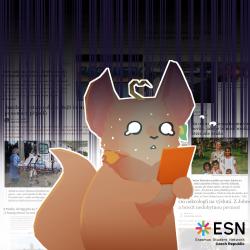Information! Data! News! Media - there are so many of them and it is up to you which ones you choose. It must be pointed out however that you should not choose the ones you like the most, but the most objective and reliable ones. When given a logical order, data carry information. This can be interpreted in many different ways and it is best when you can make your own opinion based on the data. Not every time we understand the data though. This is when the data needs to be processed to information and then presented to you. This information based on the same data can vary drastically.
According to statista.com, adults spend on average around 145 minutes on social media daily. During this time, they are bombarded with all the different information, sometimes even in direct disagreement or one denying the other and vice versa. Portal medialiteracynow.org states that children from 8 to 18 spend on average 7 and a half hours with entertainment media. Being exposed to all the information, we need to understand how to interpret them. Research by Roger Bon at the University of California believes, that we can face as much as 34 GB of information every day.
Media literacy teaches us how to critically think about messages shared by the media and how to use their information to create our own message or interpretation. Critical thinking about the received information is crucial to our mental health and well-being. Do not overdose on information, especially nowadays, positive news is quite rare, which might initiate feelings of sadness, hopelessness, and anxiety.
There are also positive aspects of social media. Human beings are social creatures, who need social contact. Social media is an acceptable replacement for us when it is needed to limit in-person contacts. They should not and can not replace physical and in-person contact. Spending too much time on social media can make you feel more lonely and can lead to problems such as depression and anxiety. Social media also has many benefits, that is why we use them. Mainly we can keep in touch regardless of our location, we can meet new people, engage in the local communities, seek emotional support, discover new things or enhance creativity. You are creating your content and feed. You can choose what you want or do not want to see, this is mainly affected by the people and pages you follow. Keep your list updated as you as a person constantly evolve as well as the content. If it changes the way you do not like, just unfollow them. On the other hand, social media can create unrealistic ideals and high expectations. Fear of missing out can also hit some users. Fear that you can miss something important is the fuel of anxiety, do not let it burn. Reducing your social media time can actually help you feel less lonely and improve your wellbeing. Remember that social media are a powerful tool of today and they need to be handled with care.
There are many sources of information to choose from. The form surely plays a role, but the content is crucial. The form plays a role because you can not expect a serious article in a tabloid or an article about a celebrity’s wedding in a scientific journal. Be aware of conspiracy theories, they may be dangerous. These theories are based on half-true or total fiction. There is usually a missing piece or there are some questionable matters. They are meant to spread misinformation, create panic, affect the public meaning and/or to manipulate your opinion.
When searching for information, it is recommended not to trust every information source or media. A few tips on what to take into consideration:
- the author should be listed and credited and also traceable,
- an article should feature at least two serious references,
- the information in the article should be true; you should be able to verify the information in other sources/articles,
- an opinion of an expert in the field, as well as a balance of all parties involved in the problematics, should be reflected in the article,
- arguments should not act on your emotions to make you convinced,
- one’s opinion should not be presented as a fact, but rather clearly stated to be an opinion of an expert or ordinary public.
Some articles might try to manipulate the content. The signs of a not reliable article might be a wrong cause to a certain consequence or a wrong derivation from a consequence. An attack on the personality of a reader, politician, scientist or just a public person is a sign of a poor manipulative article with almost no relevant arguments. The information in an article should be current, so check the date before panicking or getting too excited. If you know you can trust a source because it is reliable and maybe you use it on daily basis, you do not need to evaluate its quality every single time. It is also understandable that you do not need to do extensive research on reliability when you are searching just for a simple piece of information. Just remember to be careful.
We are nowadays being exposed to an enormous amount of information every day. We need to distinguish between reliable and unreliable sources, we should have control over our content and feed, do not overshare and most importantly do not get ourselves overdosed with information. Be sure to take some informational and technical detox from time to time. We are living in an information age. Choose your sources wisely and be careful with them. Think critically and form your own opinion based on the facts. Do not forget however to listen to the opinions of others.

